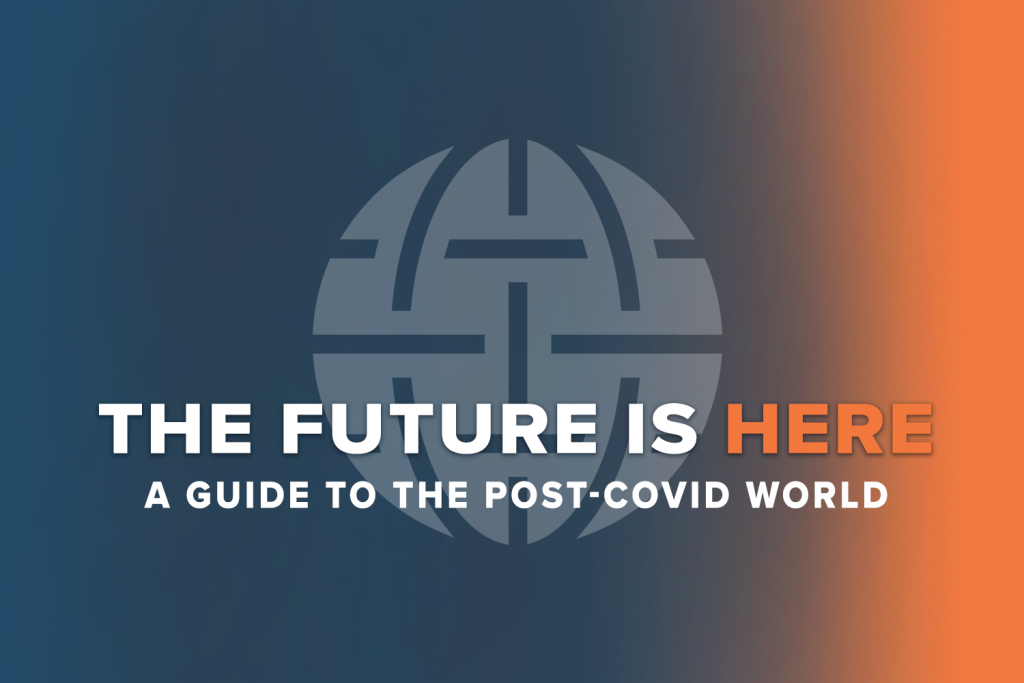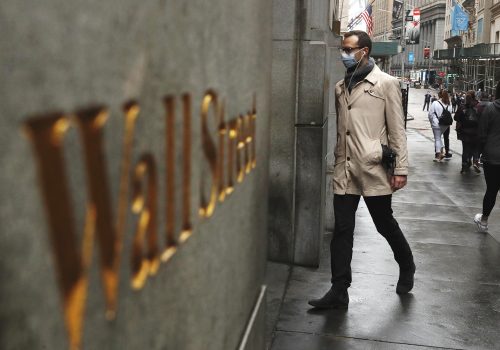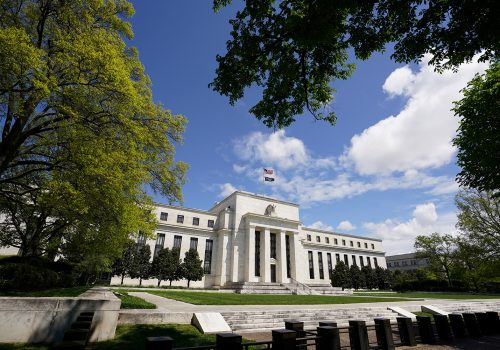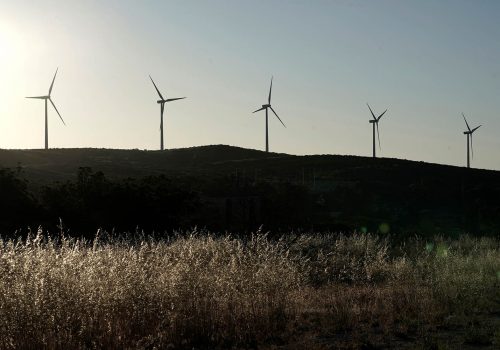The future is here: A guide to the post-COVID world 10/02/2020
Welcome to your guide to where the world is headed during the pandemic era and beyond. Each week, we’ll bring you the latest and most significant expert insights and international news about how coronavirus is reshaping international affairs. To stay updated each week, sign up to the newsletter here.
Let’s take a spin around the globe, in seven minutes or less.
In top stories this week:
- Quit the dithering, Germany’s Angela Merkel says, urging more support for a global vaccine effort.
- Stimulus money for European countries is running late, while relief funds for vulnerable US families are dwindling.
- The pandemic may be boosting innovation, and not just in vaccine technology and healthcare.
- But first…
The big story
This week’s key theme: Latin America is linking recovery with resilience
Of the ten countries with the highest COVID-19 death rates per 100,000 people in the world, six are in Latin America or the Caribbean. The dire situation has produced a novel response: Countries and organizations in the region are collaborating through multilateral partnerships that aim not only to help countries navigate the currents crisis but also to bolster their resilience to future crises.
“The mantra is to rebuild better, [and] to rebuild better means build in a sustainable way and provide a resilient recovery,” Carlos Pinto, the country manager for Brazil at the International Finance Corporation, told the Atlantic Council’s Adrienne Arsht Latin America Center at the launch of its new Caribbean program.
At the moment, the pandemic is wreaking havoc on the region’s health sector and economy. The International Monetary Fund (IMF) has predicted that gross domestic product will shrink by 9.4 percent in 2020 and the UN’s Economic Commission for Latin America and the Caribbean (ECLAC) has predicted that 45 million people in the region could fall below the poverty line over the course of 2020. The “spread of poverty [and] the spread of unemployment” have “increased debt to households, to governments, and to businesses,” Luis Alberto Moreno, president of the Inter-American Development Bank (IDB), told the Atlantic Council, making it more difficult for the region to rebound from the pandemic and increasing its fragility ahead of future crises.
Subscribe to The future is here: A guide to the post-COVID world
Sign up for a weekly roundup of top expert insights and international news about how coronavirus is reshaping international affairs.

Too big to face alone
“We are all convinced that collaborations can bring about change,” Carissa Etienne, director of the Pan American Health Organization (PAHO), said as she appeared alongside Pinto. “This pandemic is too consequential, it’s too big, for any one health sector or any one organization.”
As a result, PAHO is working with multilateral organizations such as the IDB, IMF, World Bank, and ECLAC to respond to the pandemic by devising economic-recovery plans and increasing access to medical equipment, lab tests, diagnostics, and personal protective equipment. Other collective action involves assisting workers in the informal economy, a segment of the population dominated by women and also subject to the highest increases in COVID-19 infections. “Unless you deal with the pandemic in the health sphere, you’re never going to recover your economy,” Etienne said.
The bottom line: Latin American and Caribbean countries are confronting huge challenges as they strive to recover from the pandemic. But as they do, many actors in the region are also championing a key insight: that supporting vulnerable people is an investment not just in the management of the crisis, but also in resilience to other crises that are sure to come.
The big picture
This week’s key theme, visualized: The pandemic is also a poverty crisis
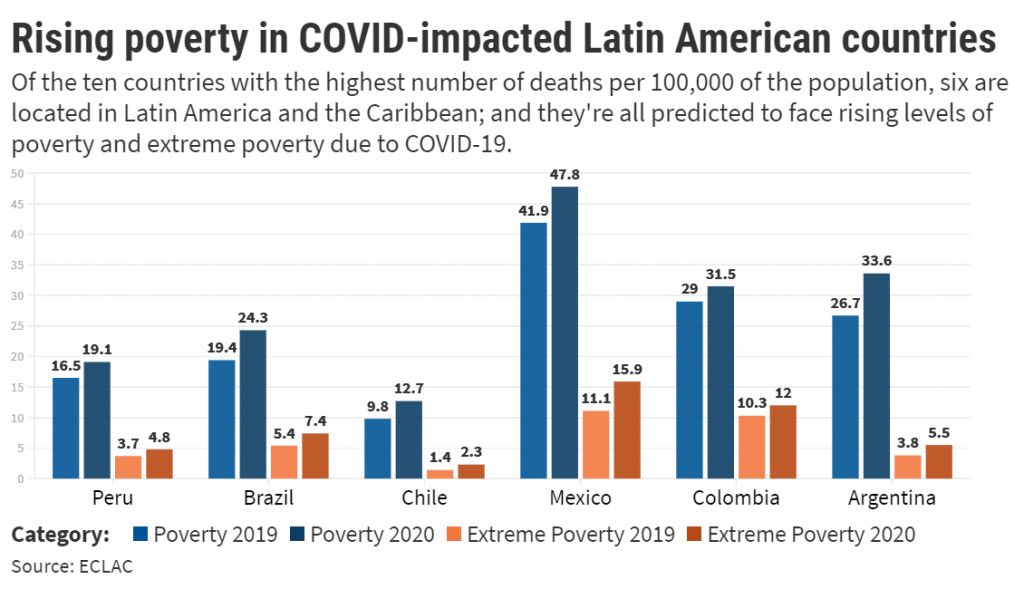
The world in brief
Insights from across the planet, in ten bullets or fewer
- The link between global economic recovery and universal vaccine access is becoming clearer. German Chancellor Angela Merkel told world leaders to stop dithering and back the global vaccine effort; she also pledged $100 million to help developing nations get access to a COVID-19 vaccine. World Bank President David Malpass warned that “broad, rapid, and affordable” access to vaccines will be the core of economic recovery that benefits everyone, Reuters reports. The global fund Covax, which aims to deliver two billion vaccine doses by the end of 2021, has received three billion dollars in backing from governments worldwide—but it needs another $35 billion to meet its aims, the newswire also says.
- In-person education is showing mixed results across Europe. Several weeks after classes restarted in Europe, experts there say it’s rare for children to spread the virus while at school, The Washington Post reports. But thousands of university students in the United Kingdom are under lockdown because of outbreaks, in cities from Manchester to Glasgow and Exeter, the Financial Times says. And in French cities including Nice, students are growing aggravated as lecture halls fill up with too many people to allow for social distancing.
- The global travel slump could put 46 million jobs at risk. The jobs are in sectors ranging from tourism to construction, reports the Air Transport Action Group, which adds that it doesn’t expect a return to pre-COVID-19 air travel until about 2024, the BBC reports. Tens of thousands of US airline workers are taking early retirement, leaves of absence, and buyouts as they also fear that air-travel demand will be slow to recover, The New York Times says.
- Europe’s recovery fund will face “unavoidable” delays, warned Germany’s ambassador to the European Union, Michael Clauss. The original plans to make the $2.1 trillion fund operational by January 1 may be jeopardized by disagreement about whether to make pay-outs dependent on member states adhering to democratic standards, Bloomberg says. Meanwhile, the recovery of the bloc’s pandemic-roiled economy may be faltering as consumer and business confidence in September increased by the least in five months, the Financial Times says.
- The United States is experiencing a trade surprise. Imports to the country have recovered much more quickly than exports, as Americans who were able to keep working during the pandemic saved money that they’re now spending on imports such as televisions and video-game consoles, Quartz says. US exports of airplanes and parts have suffered, while trade spats with China have meant lower US sales of soybeans. Meanwhile, CNBC has published five charts showing just how much the United States and China have become economically dependent on each other over the past decade, making a parting of ways on trade challenging.
- Americans are starting to feel more optimistic about the economy, but all is not roses. While consumers are feeling more chipper about the state of the US economy, retailers are still feeling the impact of store closures, which reached a record high in the first half of the year, The Wall Street Journal reports. Meanwhile, the most vulnerable families in the United States are facing a financial crisis if government relief such as stimulus checks and expanded unemployment benefits dwindle, CNBC cites the Federal Reserve as saying.
- Can the pandemic speed up the pace of innovation? COVID-19 has accelerated the Singaporean government’s digital transformation as companies rely more on electronic payments, artificial intelligence, and data analytics—not just in response to government incentives, but also as a way of becoming more productive and resilient, the Financial Times reports. UK Prime Minister Boris Johnson pledged a “radical” overhaul of adult education to help boost the post-pandemic economic recovery, but opposition legislators are skeptical. Meanwhile, Japan’s new prime minister, Yoshihide Suga, is trying to digitize the government but is facing a hurdle: The country’s health workers have mostly snubbed a new COVID-19 database, saying that it’s too time-consuming, Reuters reports.
- COVID-19 job cuts bite, pausing dream-job searches. Disney will lay off 28,000 workers, citing the prolonged closure of its California theme parks, and oil major Royal Dutch Shell plans to cut between 7,000 and 9,000 jobs through 2022, CNBC reports. Meanwhile, more than a third of young people in the United Kingdom think they need to give up on hopes of getting their dream job in favor of getting “any job” in the midst of economic crisis, according to a study for Prince Charles’s youth charity The Prince’s Trust.
- Patience is wearing thin on pandemic curbs. Residents across the forty-five locked-down neighborhoods of Madrid are growing infuriated with local coronavirus restrictions as some see the restrictions as disproportionately affecting more economically vulnerable districts, The New York Times reports. Local officials accepted, without much enthusiasm, a city-wide lockdown imposed after days of arguments. Meanwhile, UK white-collar workers are ignoring Prime Minister Boris Johnson’s pleas to work from home if they can, Bloomberg says. Johnson, under fire for his handling of the pandemic, has promised more input into any new restrictions as infection numbers continue to increase.
- Corporations could follow remote workers in swapping megacities for tranquil islands. That’s the ambition, at least, of the Japanese staffing company Pasona, which plans to move its headquarters from Tokyo (population 37 million) to the Japanese island of Awaji (population 129,000), in the latest sign of how the pandemic is restructuring where and how people work worldwide, The Washington Post reports. Meanwhile in the UK, a waiver on property tax and low interest rates led to a jump in mortgage approvals, but city-dwellers’ appetite to move further out may also be at play, The Guardian says.
The inside scoop
Insights from the Atlantic Council
